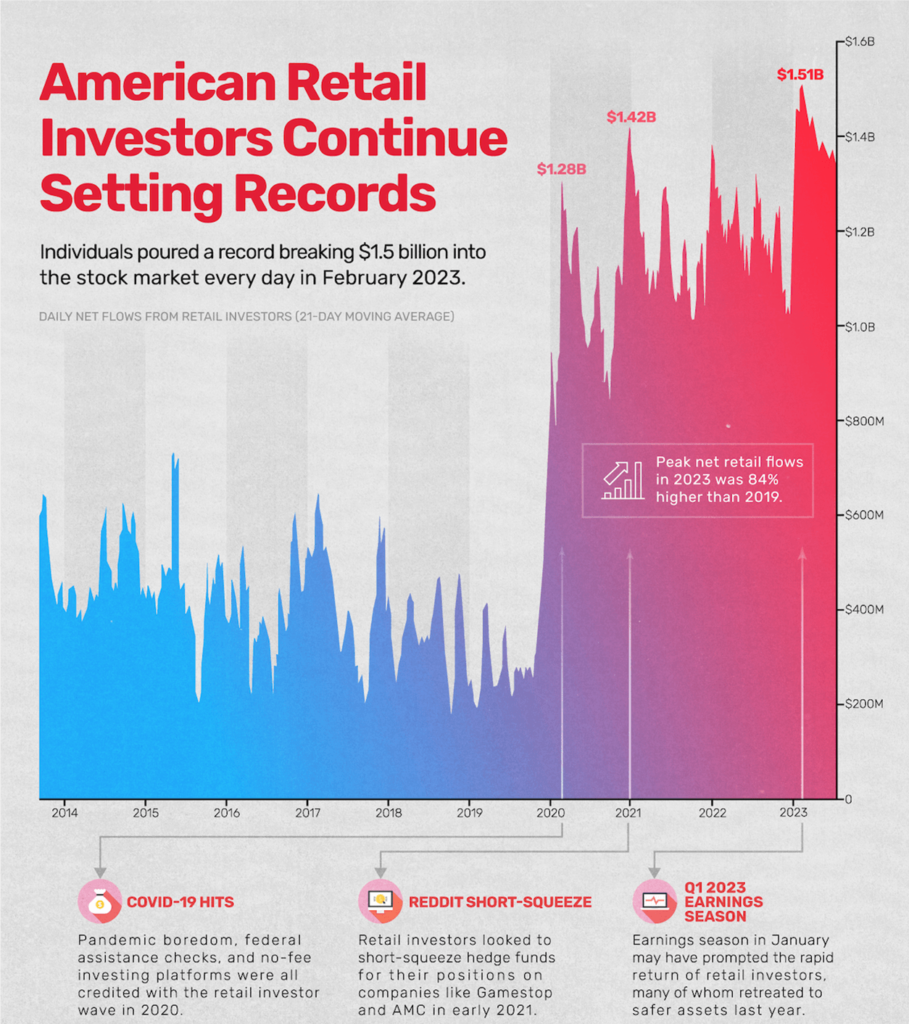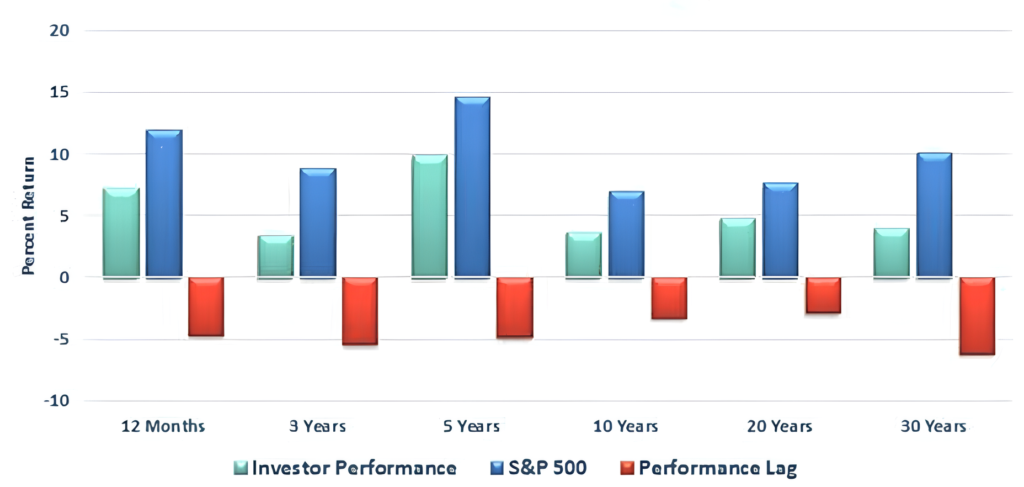This article thoroughly explores the negative impact of excessive trading on long-term wealth, offering valuable insights and smart investment tips to mitigate potential losses.
Retail Investor Surge
The stock market has experienced a surge in retail investors over the past year, driven by low-interest rates and increased access to online trading platforms. This trend is global, observed from the US to India, South Korea, and Australia.

Source: Charted: U.S. Retail Investor Inflows (2014–2023)
Yet, the question remains: how can a retail investor generate strong and sustainable returns? It’s widely acknowledged in the investment community that the majority of retail traders incur losses – over 70%. Studies have consistently shown that retail DIY investors consistently underperform a buy-and-hold strategy centered on the S&P 500, often by more than 5% annually. One of the reasons for losing is excessive trading. According to the statistics of a trading platform, in the 18 months leading up to July 2021, over 70% of trades were closed within 24 hours, with nearly half closed within 60 minutes. Additionally, losing positions were closed 1.4 times more frequently within five minutes than winning ones, highlighting the risks of excessive trading.

Reasons Excessive Trading Hurts Wealth
Psychological biases:
Both newcomers and experts often fall prey to psychological biases, which can result in the loss of their funds. These losses can be huge: The bull run during the pandemic saw retail traders lose more than $1 billion, according to a Bloomberg Study. Psychology plays a crucial role in shaping the investment decisions of retail investors and their overall financial outcomes. Here are some common biases that lead to excessive trading and, consequently, investment losses:
- Overconfidence Bias: DIY investors often exhibit overconfidence in their ability to predict market movements and make successful investment decisions. This bias can lead to excessive trading and a reluctance to seek professional advice.
- Loss Aversion: DIY investors typically fear losses more than they value potential gains. This aversion can prompt investors to sell winning positions too soon or hold onto losing investments longer than they should.
- Herd Mentality: Following the crowd is a common trait among investors. According to a survey, stock owners were 48% more likely to monitor the stock market via social media than exchange websites.
- Recency Bias: DIY investors tend to place undue emphasis on recent market events or trends, expecting them to persist. This bias can lead to impulsive decision-making based on short-term performance rather than a comprehensive assessment of long-term fundamentals.
Unignorable opportunity costs:
For retail traders, excessive trading with profound market research imposes a substantial time burden. This practice incurs a significant opportunity cost, diverting resources that could be allocated to other valuable endeavors.
Many retail investors are working hard at managing their portfolios and setting aside regular time for research and strategy, according to new investor trend research. The study found nearly half of investors (45%) say they have a strong focus on research with 13% claiming to research every part of an investment before committing their cash. The commitment to managing their investments involves putting in the hours – around 28% set aside time every week to work on their portfolio with one in eight (12%) spending at least an hour a day.
The rigorous analysis required for frequent trading activities not only consumes time but also detracts from opportunities for skill development, relaxation, or alternative income-generating activities. Considering the tiny difference between the return of active retail traders and the market index, mitigating the time burden associated with excessive trading may yield more favorable long-term results for retail traders.
Market price impact:
As discussed in “Market Liquidity: Theory, Evidence, and Policy” by Thierry Foucault, Marco Pagano, and Ailsa Röell, each trade moves market prices in unfavorable directions on both sides and leads to less favorable prices for subsequent trades, making entertaining trading less fun.
What to do instead?
For Beginners: If you’re just starting in the world of investing, it’s essential to build a solid foundation for your portfolio. One of the safest and most straightforward options for beginners is to stick to Exchange-Traded Funds (ETFs). These investment funds offer diversification across a range of assets, making them a relatively low-risk option for those new to investing.
For Intermediate Investors: If you’ve already dipped your toes into investing and are looking to take it to the next level, consider diversifying your portfolio with a mix of ETFs and individual stocks. However, navigating the stock market can be tricky, so it’s essential to learn the proper way to manage your portfolio, not merely relying on random stock picks. Alternatively, consider seeking the guidance of a trustworthy investment advisor or professional investment management service, such as Alphanso. These experts can help you tailor your investment strategy to your specific goals and risk tolerance, providing valuable insights and recommendations along the way.
For Pro Investors: For seasoned investors looking to maximize their returns and optimize their portfolios, building diversified portfolios using advanced research tools and systems is key. These investors understand the importance of thorough research and analysis in identifying promising investment opportunities.
How can Alphanso help you?
To help investors develop better investment strategies and save valuable time, Alphanso has developed an AI-based investment platform. As your personal investment advisor, Alphanso not only provides personalized stock recommendations but also provides valuable research by rating 3000+ stocks and ETFs. With Alphanso’s expertise and advanced tools at your disposal, you can take your investments to the next level and achieve your financial goals with confidence.





